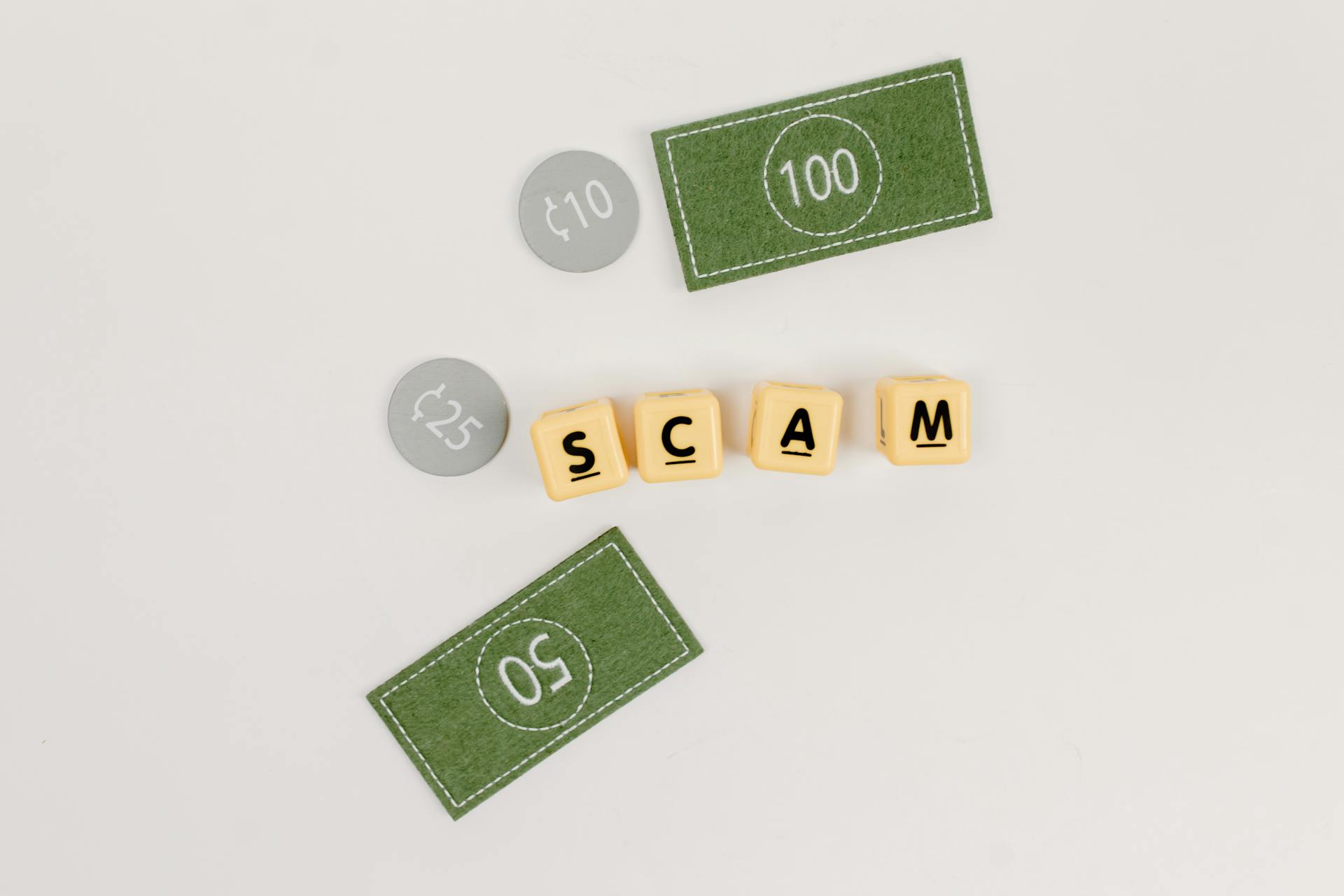
Fake payday loan collection emails are on the rise, and it's essential to know how to protect yourself from falling victim to these scams. These emails often claim that you've missed a payment or that your account is in arrears.
Be wary of emails that demand immediate action, as they may be trying to create a sense of urgency to get you to reveal sensitive information. Some emails may even threaten to send your account to collections or report you to credit bureaus.
If you receive an email claiming to be from a payday lender, take a step back and verify the authenticity of the email. Check the sender's email address and look for any spelling or grammatical errors.
Legitimate payday lenders will never ask you to pay a fee via wire transfer or prepaid debit card. They may ask for payment, but it will be through a secure online portal or a phone call.
A different take: Missed Payday Loan Payment
Recognizing Fake Emails
Scammers can easily create a website that looks professional, so don't be fooled by appearances. Making a professional-looking website now requires little to no coding knowledge.
Be cautious of emails that seem too good to be true, as they often are. Scammers send fake emails to trick people into replying to loan offers.
Spotting Collectors
Spotting Collectors can be a challenge, but it's crucial to protect yourself from scammers. A fake debt collector may want you to repay a debt you don't recognize.
To spot a fake debt collector, look out for these red flags: they may refuse to give you their mailing address or phone number, or try to scare you into paying by threatening to report you to law enforcement or have you arrested.
Don't respond to threats - hang up and report them if they threaten to arrest you, suspend your driver's license, or call your employer. If you think you don't owe some or all of the debt, dispute it with the collector by mail or online.
Here are some warning signs of a fake debt collector:
- They want you to repay a debt you don't recognize
- They refuse to give you their mailing address or phone number
- They pressure you or try to scare you into paying
Just Because It Looks Official Doesn't Mean It Is
Just because it looks official doesn't mean it is. Scammers can easily create a website that appears professional, requiring little to no coding knowledge. Scammers can pretend to have a business and send fake emails with loan offers that are too good to be true.
They can make websites appear professional and even send fake emails. Their goal is to trick people into replying to loan offers that are suspicious. Don't trust a website just because it looks official.
Scammers can easily create a website that appears professional, requiring little to no coding knowledge. They pretend to have a business and send fake emails. Their goal is to trick people into replying to loan offers that are too good to be true.
To avoid falling for these scams, look for a legitimate lender's website, phone number, and physical address across the Internet. A legitimate lender usually has the following: good rankings from the Better Business Bureau (BBB) or other official ratings, consistent positive ratings on the web, proper grammar and professional communication, a uniform website, phone number, and physical address across the Internet that is easy to verify.
You might like: $255 Payday Loans Direct Lender
Here are some red flags to watch out for:
Don't trust a website just because it looks official. Scammers can create fake websites and emails that appear professional. Look for red flags like suspicious websites, poor grammar and spelling mistakes, lack of verification, and threats or intimidation.
Self-Protection
Protect yourself from fake payday loan collection emails by being aware of the warning signs. Scammers often use non-business email addresses, such as [email protected] or [email protected], to contact you.
Be cautious of emails that threaten legal or criminal action if you don't reply. Legitimate debt collectors cannot threaten you with arrest or legal action.
Verify the legitimacy of the lender by checking their registration status in your state. You can also check their identification on Google before sending any information.
Don't wire money or provide prepaid debit card info as a "show of good faith." This is a common tactic used by scammers to get their hands on your money.
Worth a look: Easy Money Payday Loan Requirements
Keep a record of all your outstanding debt along with lender contact information. This will help you recognize when someone is trying to force you into repayment of a non-existent debt.
If approached by someone claiming you owe them a debt, demand proof of it. Legitimate debt collectors are required to provide written proof upon request.
Here are some red flags to watch out for:
Regularly review your statements and registers for unrecognized transactions. Check your credit report regularly to ensure there are no unauthorized accounts or debts.
Verifying Legitimacy
To verify the legitimacy of a lender or debt collection agency, you can check for specific red flags. A legitimate lender typically has good rankings from the Better Business Bureau (BBB) or other official ratings.
You can also check their online presence, looking for consistent positive ratings on the web. A legitimate lender will have proper grammar and professional communication in their emails, texts, and website.
For another approach, see: California Payday Loan Direct Lender Only
Their website, phone number, and physical address should be uniform across the Internet and easy to verify. You should be able to find this information without receiving any suspicious links or URLs.
Here are some key things to look for in a legitimate lender or debt collection agency:
- Good rankings from the BBB or other official ratings
- Consistent positive ratings on the web
- Proper grammar and professional communication
- Uniform website, phone number, and physical address across the Internet
If you're unsure about a lender or debt collection agency, it's better to err on the side of caution and do more research. You can contact your local government office or the BBB to see if the company is registered and reputable. If you can't find the company with your local government office or the BBB, it's likely a scam.
Reporting and Recovery
If you've received a fake payday loan collection email, it's essential to report the incident to protect yourself and others. You can start by filing a report with the Canadian Anti-Fraud Centre, either online or by phone at 1-888-495-8501.
To report a fake debt collector, you can also file a complaint with the Financial Consumer Agency of Canada (FCAC), your provincial or territorial consumer affairs office, or the Better Business Bureau (BBB). These organizations can help you determine your rights and take action against the scammer.
See what others are reading: Do Payday Loans Report to Credit Bureaus
Here are some steps to take:
- File a report to the Canadian Anti-Fraud Centre to provide information that can be used to fight scam and spam callers.
- File a complaint with the Financial Consumer Agency of Canada (FCAC) or your provincial or territorial consumer affairs office about the collection agency's collection practices.
- File a complaint with the Better Business Bureau (BBB) to help protect yourself and other consumers from fraudulent debt collectors.
Additionally, you should check your insurance policy to see if it covers fraud losses or pays for identity theft expenses. Be sure to get all the answers about the services provided, the fees involved, and how you will be charged in writing if you want to engage a lawyer or company to recover money lost to fraud.
On a similar theme: Apple Cash Fraud Scam
How to Report a Collector
If you suspect a debt collector is fake or abusive, don't hesitate to report them. You can report to your state attorney general's office, the Federal Trade Commission, or the Consumer Financial Protection Bureau. Many states have laws that differ from federal laws, so your state attorney general's office can help you understand your rights.
To report a fake debt collector in Canada, you can file a report with the Canadian Anti-Fraud Centre, the Financial Consumer Agency of Canada, your provincial or territorial consumer affairs office, or the Better Business Bureau. These organizations can help you take action against scammers.
Intriguing read: Debt Reduction Scams
A fake debt collector may try to pressure you into paying a debt you don't recognize or refuse to give you their contact information. If they threaten to report you to law enforcement or have you arrested, hang up and report them immediately.
Here are the steps to report a fake debt collector in Canada:
By reporting fake debt collectors, you can help protect yourself and other consumers from falling victim to scams.
Check Insurance Coverage and Financial Recovery Steps
Before you start the recovery process, it's essential to check your insurance policy to see if it covers fraud losses or pays for identity theft expenses.
Your insurance coverage may only include your initial investment and not the expected amount.
Get all the answers about the services provided, the fees involved, and how you will be charged in writing if you want to engage a lawyer or company to recover money lost to fraud.
Reading the fine print will help you understand what you're getting into and what to expect from the recovery process.
You might enjoy: Creditone Bank Fraud
Frequently Asked Questions
Can payday loans go to collections?
Yes, unpaid payday loans can be sent to collections, potentially harming your credit score and future loan options.
Sources
- https://consumer.ftc.gov/articles/fake-abusive-debt-collectors
- https://consumer.ftc.gov/consumer-alerts/2017/08/phantom-debt-collectors-impersonate-law-firms
- https://www.cash1loans.com/blog-news/how-to-identify-online-loan-scams
- https://www.3riversfcu.org/blog/post/payday-scams-how-they-work-how-to-protect-against-them
- https://loanscanada.ca/debt/how-to-tell-if-your-debt-collector-is-a-fraud/
Featured Images: pexels.com


